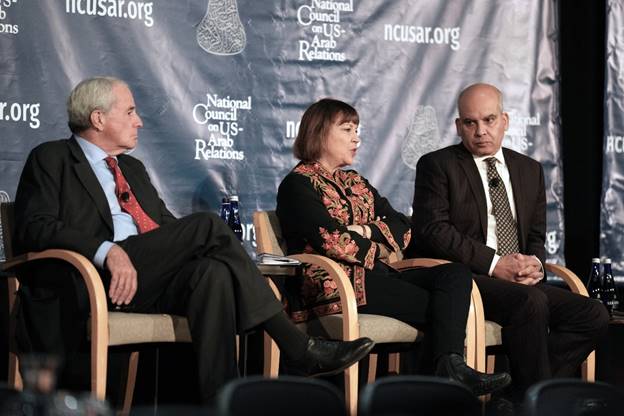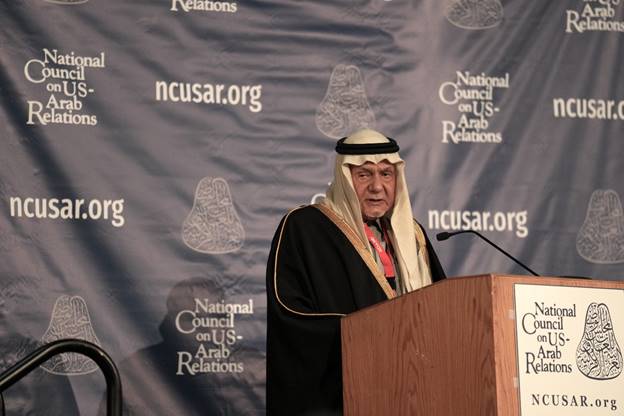

From left: Charles Glass, Judith Miller, and Abderrahim Foukara

Prince Turki Al Faisal Al-Saud
After US Elections, Challenges for Arab World Dominate NCUSAR Conference
By Elaine Pasquini
Photos by Phil Pasquini
Washington: Challenges facing the Arab world following the election of Donald J. Trump as the next US president dominated many sessions of the National Council on US-Arab Relations 32nd annual Arab-US Policymakers Conference at the Ronald Reagan Building and International Trade Center in Washington, DC on November 12-13, 2024.
“While no one knows what will happen in a Trump administration, there are parts of the Arab world that feel a little bit hopeful and others are jittery about whether he will be able to end the wars as he promised in his campaign,” Al Jazeera Washington, DC bureau chief Abderrahim Foukara stated in the opening panel. “Some people are betting on the unpredictability of Donald Trump to deal with the issues. But every single appointment that Trump has made looks like things will not go down well for Iran, Gaza and the West Bank in terms to annex the West Bank.”
Noting the large protests in Arab countries over Israel’s war on Gaza, the longtime journalist said the extent of civilian casualties in the devastated enclave, particularly among children, has “shocked and angered a lot of people in the Arab world and well beyond, including here in the United States.”
In Dearborn, Michigan where many Arab Americans voted for Trump, “the Biden administration and Kamala Harris paid the price electorally for their policy,” Foukara noted. “Many Americans who put their name and futures on the line in anti-war protests have voted with what many of them describe as their moral compass.”
Former New York Times reporter Judith Miller weighed in, stating that “no one knows what Trump is going to do.” In addition, she argued: “If Trump gives Netanyahu a blank check, that is at odds with his other commitment to end the wars.” Miller claims Iran is the problem right now with its proxies in Yemen and Lebanon. “I haven’t seen Donald Trump, Netanyahu or anyone articulate what is to be done about Iran,” she said.
According to journalist and author Charles Glass, the major regional fear is that Israel will drag the United States into a war with Iran. “We know America’s attempts to restrain Netanyahu are futile,” he added.
A ceasefire in Lebanon, where Glass resides part-time, will happen only when there is a ceasefire in Gaza. “But it’s not a solution,” he stressed. “It’s a temporary fix after which there should be – but won’t be – movement towards a solution.”
Since the Madrid Conference in 1991 there has never been any real serious attempt to have peace between Israel and the Palestinians on the basis of either a single secular democratic state or a two-state solution, Glass pointed out. “The peace process,” he insisted, “is a sham and has been a sham since the beginning and will remain a sham. But at least to stop the mass murder that is going on in Gaza and Lebanon, there should be a ceasefire in Gaza…but that is not a solution to the whole thing.”
Discussing the difference between the terms “anti-Semitism and anti-Zionism,” Glass stated: “It’s not anti-Semitism to point out what they [the Israelis] are doing to Gaza and I think that most people now understand that. There are just too many dead children in Gaza.”
Foukara added that more and more people, even among the Jewish-American community, are beginning to see the difference between being critical of Israel and being anti-Semitic.
In his keynote address following the morning’s panel discussions, Prince Turki Al Faisal Al-Saud, chairman of the King Faisal Center for Research and Islamic Studies in Riyadh, said “a great responsibility lies on the United States’ shoulders to restore order by returning to its ideals and principles and to lead our world back to a real rule-based international order.”
With respect to the13-month Gaza war, the US stance has been a “total disappointment and it is seen in the region as complicity diplomacy that buys time for Netanyahu to finish his genocide and war on the Palestinians,” the former Saudi ambassador to the US said. “Continued failure of addressing the issue of Palestine, the mother of all conflicts in the region, has been and will continue to be the bone of contention between the Arab world and American administrations.”
(Elaine Pasquini is a freelance journalist. Her reports appear in the Washington Report on Middle East Affairs and Nuze.Ink.)

